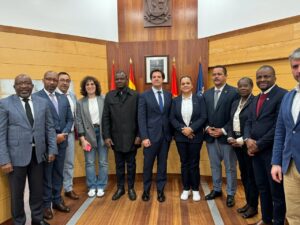
14/03/2024
The visit is part of the European project Support to Civil Society and Local Administration in Angola, PASCAL (2021-2025), implemented by FIIAPP and the Lithuanian agency CPMA.
Today ends the study visit of management and technical teams from the Ministry of Territorial Administration of Angola, provincial governments and municipal administrations of the country to learn about the Spanish experience in decentralization, governance and participatory processes at local and provincial level.
Organized by the European PASCAL project, this activity has promoted joint work processes between Angolan and Spanish specialists, as well as the exchange of technical knowledge in inter-institutional work processes and with civil society organizations.

The delegation learned about success stories in the articulation of local and provincial administrations, as well as the advantages and challenges in local and provincial administrations, as well as advantages and challenges in the association of municipalities and provinces and governance mechanisms between the central government, ministries, public agencies and civil society organizations, among others. In addition, during the visit to INJUVE they learned about public policies for youth and how to involve this population in governance processes.
The visit to the city councils of Las Rozas and Fuenlabrada has offered a perspective on the advantages of e-government at the local level and participatory budgeting processes.
In the words of Pablo López Dean, PASCAL coordinator at FIIAPP, “this visit is an opportunity to share the lessons learned from a decentralization process that began 40 years ago in Spain and is still ongoing. Spain is a reference in local administration because its territorial model is decentralized”.
For his part, the Secretary General of the FEMP, Luis Martínez-Sicluna, stressed that the best way to learn about the experiences of local administration is “visiting and talking to those who daily face the management of the public from their municipalities: mayors, mayors and municipal technicians. In his opinion, “this observation in the field is essential to understand the important role played by local governments in the construction of citizenship”. Martínez-Sicluna acknowledged the Angolan Government’s sensitivity towards decentralization and consolidation of local autarchies and the participation of citizens in public affairs, and has bet on turning the meeting “into the starting point of a stable and loyal collaboration between institutions”.
In addition, Spain is a benchmark in citizen participation processes and in the participation of civil society organizations as a preferential actor in institutional dialogue and as a manager of public services at regional and local level.


